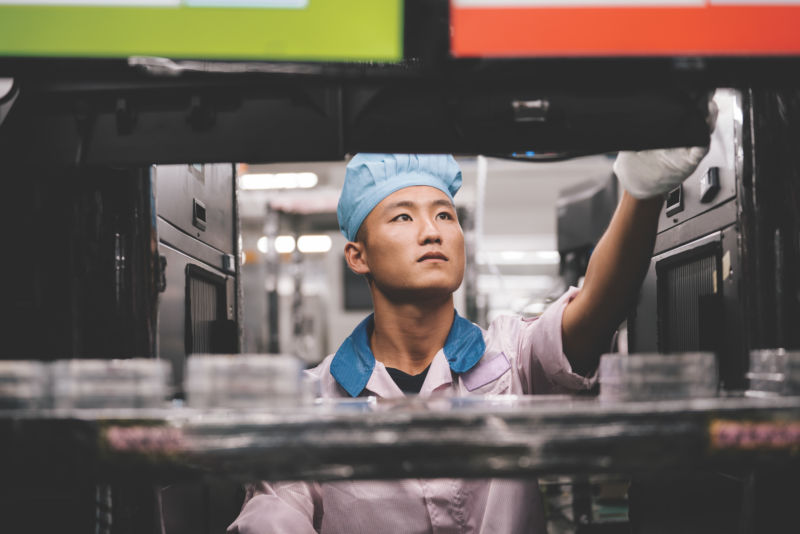
Each year, Apple releases a report called the Supplier Responsibility Progress Report detailing its audits of the labor practices of its suppliers around the world. Apple reports violations it finds at various categories of severity and gives its suppliers ratings based on how they treat their workers.
The 12th annual report was released this week, and in it, Apple says it found more violations than it did last year, at least in part because of new suppliers and partners added to supply chain.
Out of 757 suppliers included in the audit across 30 countries, 197 were being audited for the first time. Apple found twice as many “core violations” in 2017 as it did in the previous year. Core violations are those that Apple “considers the most serious breaches of compliance” and for which it claims to have “zero tolerance.”
Three of the most serious violations were debt-bonded labor violations. In one example, a supplier charged 700 workers in the Philippines a total of one million US dollars in recruitment fees for securing their jobs there. The nominal GDP per capita in the Philippines is $3,593 according to the IMF, so this is a significant burden, as workers may not be paid enough to manage the debt they take on to pay these fees. The United Nations considers debt bondage a form of slavery. Apple’s policy requires that its suppliers do not charge fees of this kind in any amount.
The company also discovered two underage labor violations, one access restriction violation, and 38 working-hour falsifications. Apple requires its suppliers to cap worker hours at 60 hours per week and to give workers at least one day of rest after working for six consecutive days, but in 38 cases, Apple found that suppliers had falsified reports about their compliance with these requirements.
Apple claims in the report that it takes the following actions when working-hour falsifications are found:
The violation is escalated to the supplier CEO, and the supplier is placed on immediate probation. The supplier’s ethics policy and management systems are then thoroughly reviewed to identify the root causes and systemically correct them. The supplier is required to undergo regular audits to ensure the reviewed policy is implemented to prevent future violations. In addition, the supplier must revise all records to reflect an accurate accounting of hours worked by their employees.
In addition to tracking specific violations, Apple gives each of its suppliers a ranking based on its compliance and standards. Here’s what the report says about Apple’s ratings:
Each assessed facility is ranked on a 100-point scale based on its performance relative to our Code of Conduct. A score of 90 to 100 is representative of a high performer. A score less than or equal to 59 is representative of a low performer. A score of 60 to 89 is representative of a medium performer. In 2017, low-performing sites in our supply chain decreased by 71 percent, while the number of high-performing supplier sites increased by 35 percent.
Apple also uses the report to highlight initiatives it drives to improve worker conditions. This time, Apple highlighted a new women’s health education initiative. The company also touted its Factory Line Leader Program, a training program that Apple claims provides “technical and soft-skills training,” “a guaranteed internship with an Apple supplier,” and “opportunity for full-time employment after graduation.”
Apple additionally released a specialized disclosure report on an audit of the ethical sourcing of conflict minerals in its supply chain, such as gold and tungsten. The company said 100 percent of its partners participated in the audit and that it dropped 10 partners from its supply chain for failure to cooperate.
Other reports
This is all based on reports issued by Apple itself. In January, Chinese watchdog China Labor Watch (CLW) issued a report criticizing the labor practices of Apple supplier Pegatron, to which Apple transitioned some of the business it previously offered Foxconn in 2013. CLW reported instances of student interns putting in more than 80 hours per week.
-
A CLW-distributed image of workers napping during a break in a supplier cafeteria.
-
An Apple-distributed image of workers at a supplier facility.
-
A China Labor Watch-distributed image of workers in a training program at a supplier facility.
-
An Apple-distributed image of a “zero waste” instruction session at a supplier facility in India.
CLW separately reported one instance of toxic gas poisoning at the Suqian Catcher Factory that affected 90 workers, among other problems. Some of CLW’s claims were corroborated by a Bloomberg investigation of the same facility. The supplier in question also works with Samsung, Lenovo, and LG. The Bloomberg report said that Apple investigated these claims itself but found no breach of standards.
“Apple does make efforts to address some of the issues we have discovered in their supplier factories; however, widespread rights violations persist,” CLW rep Elaine Lu told Supply Chain Dive.
https://arstechnica.com/?p=1272283

